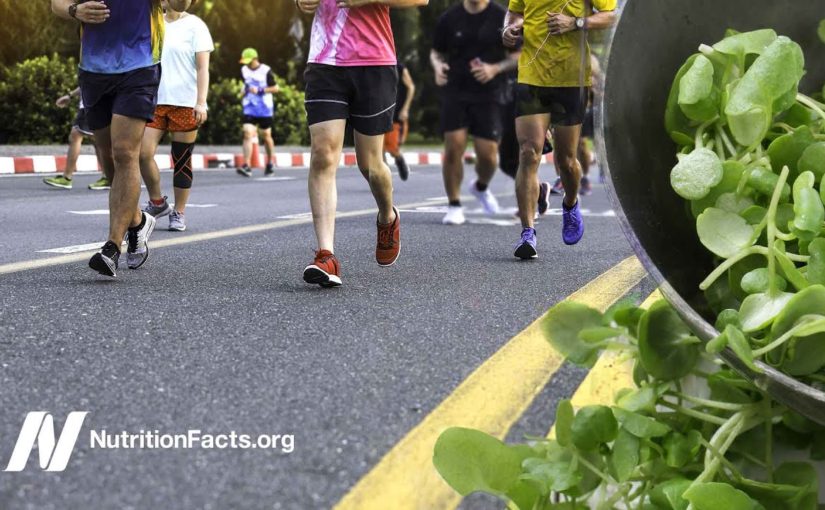“Exercise Stress and Watercress” If oxidizing glucose to produce
energy for our bodies is so messy, creating free radicals the
way cars burn their fuel produces combustion by-products
out the exhaust, even if we’re just idling,
living our day-to-day lives, what if we rev up our lives and start
exercising, really start burning fuel? Then we create more free radicals,
more oxidative stress and so need to eat even more
antioxidant-rich foods. Why do we care about
oxidative stress? Well, it’s “implicated in virtually
every known human disease” “and there is an increasing body of evidence linking
free radical production to the process of aging”. Why? Because free radicals
can damage DNA, our very genetic code. Well if free radicals damage DNA, and exercise produces free radicals, does physical activity induce DNA damage if we don’t have enough antioxidants
in our system to douse the radicals? Yes, in fact, ultra-marathoners
show evidence of DNA damage in about 10% of their cells
tested during a race, which may last for up to
two weeks after a marathon. But what about just
short bouts of exercise? We didn’t know until recently. After just 5 minutes of
moderate or intense cycling, you can get an uptick in DNA damage. We think it’s the oxidative stress, but “regardless of the mechanism
of exercise-induced DNA damage” “the fact that a very short
bout of high-intensity exercise” “can cause an increase
in damage to DNA” “is a cause for concern.” But we can block oxidative damage with antioxidant-rich foods. Of course when drug and supplement
companies hear antioxidant-rich foods they think, pills! You can’t make billions on broccoli, so “Pharmacological antioxidant
vitamins have been investigated” “for a prophylactic effect against
exercise-induced oxidative stress.” However, large doses
are often required and in pill form may ironically
lead to a state of pro-oxidation and even more oxidative damage. For example, guys doing arm curls
taking 500 mg of vitamin C appeared to have more muscle damage, inflammation, and oxidative stress. So, instead of vitamin supplementation, how about supplementation with watercress, the badass of the broccoli family? What if two hours before exercise
you eat a serving of raw watercress, then get thrown on a treadmill whose slope gets cranked up higher
and higher until you basically collapse? In the control group, without
the watercress preload, which I imagine would
describe most athletes, here’s the amount of free radicals
in their bloodstream at rest and after exhaustive exercise, which is what you’d expect. So, if you eat a super-healthy
antioxidant-packed plant food like watercress before you exercise
can you blunt this effect? Even better. You end up
better than you started! At rest after the watercress, you may
start out with fewer free radicals, but only when you stress
your body to exhaustion can you see the watercress really
flex its antioxidant muscle. So, what happens to DNA damage? Well in a test tube, you take
some human blood cells bathed in free radicals you can
reduce the DNA damage it causes by 70% within minutes of dripping
some watercress on them.

But does that happen within the human body if you just eat it? We didn’t know until recently. If you exercise without
watercress in your system, DNA damage shoots up, but if you’ve been eating a single
serving a day for two months your body’s so juiced up
on green leafy goodness no significant damage after punishing yourself
on the treadmill. So, a healthy diet can
you can get all the benefits of strenuous exercise
without the potential risks? We know regular physical exercise — a key component of a healthy lifestyle, but it can elicit oxidative stress. To reduce that stress
some have suggested pills to improve one’s
antioxidant defense system, but “those eating more plant-based
diets may naturally” “have an enhanced antioxidant defense system” without pills to counter
exercise-induced oxidative stress due to the increased
quantities of plants. Remember plant foods’ average
64 times more antioxidants than meat, fish, eggs, and dairy. And on top of that the
animal protein itself can have a pro-oxidant effect. But look, anyone eating sufficient
quantities of whole healthy plant foods could plausibly reach
an antioxidant status similar to those eating vegetarians. It’s not just about what
you’re eating less of, saturated fat and cholesterol, but what you’re eating more of,
the phytonutrients. Whether it’s about training longer or living longer, we’ve got to eat more plants.
As found on YouTube15 Modules Of Intimate Video Training With
Dr. Joe Vitale – You’re getting simple and proven steps to unlock the Awakened Millionaire Mindset: giving you a path to MORE money, …

 But does that happen within the human body if you just eat it? We didn’t know until recently. If you exercise without
watercress in your system, DNA damage shoots up, but if you’ve been eating a single
serving a day for two months your body’s so juiced up
on green leafy goodness no significant damage after punishing yourself
on the treadmill. So, a healthy diet can
you can get all the benefits of strenuous exercise
without the potential risks? We know regular physical exercise — a key component of a healthy lifestyle, but it can elicit oxidative stress. To reduce that stress
some have suggested pills to improve one’s
antioxidant defense system, but “those eating more plant-based
diets may naturally” “have an enhanced antioxidant defense system” without pills to counter
exercise-induced oxidative stress due to the increased
quantities of plants. Remember plant foods’ average
64 times more antioxidants than meat, fish, eggs, and dairy. And on top of that the
animal protein itself can have a pro-oxidant effect. But look, anyone eating sufficient
quantities of whole healthy plant foods could plausibly reach
an antioxidant status similar to those eating vegetarians. It’s not just about what
you’re eating less of, saturated fat and cholesterol, but what you’re eating more of,
the phytonutrients. Whether it’s about training longer or living longer, we’ve got to eat more plants.As found on YouTube15 Modules Of Intimate Video Training With Dr. Joe Vitale – You’re getting simple and proven steps to unlock the Awakened Millionaire Mindset: giving you a path to MORE money, …
But does that happen within the human body if you just eat it? We didn’t know until recently. If you exercise without
watercress in your system, DNA damage shoots up, but if you’ve been eating a single
serving a day for two months your body’s so juiced up
on green leafy goodness no significant damage after punishing yourself
on the treadmill. So, a healthy diet can
you can get all the benefits of strenuous exercise
without the potential risks? We know regular physical exercise — a key component of a healthy lifestyle, but it can elicit oxidative stress. To reduce that stress
some have suggested pills to improve one’s
antioxidant defense system, but “those eating more plant-based
diets may naturally” “have an enhanced antioxidant defense system” without pills to counter
exercise-induced oxidative stress due to the increased
quantities of plants. Remember plant foods’ average
64 times more antioxidants than meat, fish, eggs, and dairy. And on top of that the
animal protein itself can have a pro-oxidant effect. But look, anyone eating sufficient
quantities of whole healthy plant foods could plausibly reach
an antioxidant status similar to those eating vegetarians. It’s not just about what
you’re eating less of, saturated fat and cholesterol, but what you’re eating more of,
the phytonutrients. Whether it’s about training longer or living longer, we’ve got to eat more plants.As found on YouTube15 Modules Of Intimate Video Training With Dr. Joe Vitale – You’re getting simple and proven steps to unlock the Awakened Millionaire Mindset: giving you a path to MORE money, …
